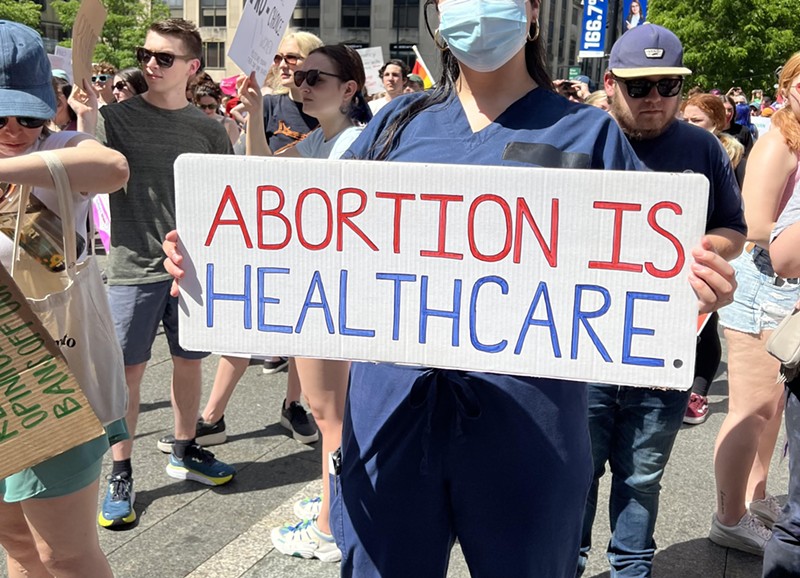
Photo: Madeline Fening
A nurse holds a sign in support of abortion access at a Planned Parenthood rally in Downtown Cincinnati on May 15, 2022.
Federal policy changes, lawsuits from pro-choice advocates and freshly-elected judges make for a kaleidoscopic view of abortion care access in the Tri-State. Here’s what to know in Ohio, Kentucky and Indiana.
Ohio
A temporary injunction from a Hamilton County Court has kept abortion legal in Ohio up until 21 weeks and six days gestation, but the most recent change in access in Ohio only applies to about twelve square miles of land.
On Jan. 12, the city of Lebanon agreed in federal court to remove certain language from its local ordinance that bans all abortions in the city. The lawsuit was jointly filed by the American Civil Liberties Union of Ohio, Democracy Forward, the National Association of Social Workers and Abortion Fund of Ohio. To avoid further time in court, the city of Lebanon agreed to a stipulation that removes the rule against “aiding and abetting” an abortion within city limits. Before the ACLU lawsuit, the vague ordinance deputized citizens to report those who help other people get an abortion, including counselors, Uber drivers and friends who simply make an abortion appointment – even if it’s outside city limits – for someone else.
Now the scope of Lebanon’s ban only bars health care providers from performing abortions or prescribing abortion medication in the city, even though there has never been an abortion provider in Lebanon. Court documents also clarified a patient’s right to ingest abortion pills within Lebanon city limits if they are prescribed elsewhere.
“An abortion where mifepristone and misoprostol are prescribed and dispensed to a pregnant woman outside Lebanon, and then she ingests the misoprostol in Lebanon, does not constitute an abortion in Lebanon,” court documents read.
Physicians who prescribe abortion drugs mifepristone and misoprostol generally agree the drugs are a safe and accessible option for those choosing to end a pregnancy. The majority of abortions are completed with medication within the first 10-12 weeks of pregnancy, according to research group Guttmacher Institute.
In early January, the Food and Drug Administration (FDA) announced that it would not enforce a rule that pregnant people need to take mifepristone in person, allowing retail pharmacies to dispense the pills. National pharmacy chains Walgreens and CVS have said they plan to seek the required certification from the FDA to dispense the pills where they are legally allowed, but Ohio Senate Bill 260, which was approved in 2021 before the overturn of Roe v. Wade last summer, bans a doctor from providing abortion drugs “unless the physician is physically present where and when the initial dose of the drug is consumed.”
Despite Ohio’s in-person requirement for dispensing abortion drugs, protestors from Progressive Anti-Abortion Uprising are planning to picket pharmacies in Akron starting in February, the organization confirmed to CityBeat.
“We want people to be uncomfortable going into a CVS that has a demonstration going on and to consider going to a different pharmacy,” said Caroline Smith, a leader of the group Progressive Anti-Abortion Uprising in a Jan. 11 Politico article. “We also want to put enough pressure on the companies to retract this decision and not get certified to sell abortion pills.”
The group said that as of press time, it has no plans at this time to picket pharmacies in Cincinnati.
On the same day Lebanon settled with the ACLU in court, the ACLU announced that Ohioans for Reproductive Freedom hired Mission Control Inc. to be the General Consultant to oversee campaign strategy for the initiative to place a measure on the ballot to amend the Ohio Constitution to protect abortion access for Ohioans. Mission Control Inc. is the same group that led campaigns for abortion protection ballot initiatives in Kansas and Kentucky during the 2022 election cycle.
On Jan. 12, the city of Lebanon agreed in federal court to remove certain language from its local ordinance that bans all abortions in the city. The lawsuit was jointly filed by the American Civil Liberties Union of Ohio, Democracy Forward, the National Association of Social Workers and Abortion Fund of Ohio. To avoid further time in court, the city of Lebanon agreed to a stipulation that removes the rule against “aiding and abetting” an abortion within city limits. Before the ACLU lawsuit, the vague ordinance deputized citizens to report those who help other people get an abortion, including counselors, Uber drivers and friends who simply make an abortion appointment – even if it’s outside city limits – for someone else.
Now the scope of Lebanon’s ban only bars health care providers from performing abortions or prescribing abortion medication in the city, even though there has never been an abortion provider in Lebanon. Court documents also clarified a patient’s right to ingest abortion pills within Lebanon city limits if they are prescribed elsewhere.
“An abortion where mifepristone and misoprostol are prescribed and dispensed to a pregnant woman outside Lebanon, and then she ingests the misoprostol in Lebanon, does not constitute an abortion in Lebanon,” court documents read.
Physicians who prescribe abortion drugs mifepristone and misoprostol generally agree the drugs are a safe and accessible option for those choosing to end a pregnancy. The majority of abortions are completed with medication within the first 10-12 weeks of pregnancy, according to research group Guttmacher Institute.
In early January, the Food and Drug Administration (FDA) announced that it would not enforce a rule that pregnant people need to take mifepristone in person, allowing retail pharmacies to dispense the pills. National pharmacy chains Walgreens and CVS have said they plan to seek the required certification from the FDA to dispense the pills where they are legally allowed, but Ohio Senate Bill 260, which was approved in 2021 before the overturn of Roe v. Wade last summer, bans a doctor from providing abortion drugs “unless the physician is physically present where and when the initial dose of the drug is consumed.”
Despite Ohio’s in-person requirement for dispensing abortion drugs, protestors from Progressive Anti-Abortion Uprising are planning to picket pharmacies in Akron starting in February, the organization confirmed to CityBeat.
“We want people to be uncomfortable going into a CVS that has a demonstration going on and to consider going to a different pharmacy,” said Caroline Smith, a leader of the group Progressive Anti-Abortion Uprising in a Jan. 11 Politico article. “We also want to put enough pressure on the companies to retract this decision and not get certified to sell abortion pills.”
The group said that as of press time, it has no plans at this time to picket pharmacies in Cincinnati.
On the same day Lebanon settled with the ACLU in court, the ACLU announced that Ohioans for Reproductive Freedom hired Mission Control Inc. to be the General Consultant to oversee campaign strategy for the initiative to place a measure on the ballot to amend the Ohio Constitution to protect abortion access for Ohioans. Mission Control Inc. is the same group that led campaigns for abortion protection ballot initiatives in Kansas and Kentucky during the 2022 election cycle.
Kentucky
While Mission Control Inc. was successful in campaigning to strike down Amendment 2 in Kentucky – which sought to amend the state’s constitution to exclude abortion protections – access to abortion care in the state remains extremely narrow.
As of press time, abortions are only allowed in Kentucky for life-saving measures or if the patient risks serious injury from the pregnancy. The Kentucky Supreme Court, which installed two new justices in January, could decide at any time whether to temporarily pause the trigger bans that halted abortion access after the overturn of Roe.
For now, Kentuckians need to go out of state for abortion care, even though there is a new FDA policy on filling abortion prescriptions.
Kentucky, like Ohio, is part of the Interstate Medical Licensure Compact, a network of states that allow doctors to become licensed to practice medicine in multiple states, including via telehealth appointments. Under the agreement, Kentucky patients would be allowed to get an out-of-state prescription for most drugs and fill it in Kentucky, but the American Pharmacists Association says the “FDA’s action does not change the current restriction on patients’ access to mifepristone in states that have banned or restricted access” to abortion care.
As of press time, abortions are only allowed in Kentucky for life-saving measures or if the patient risks serious injury from the pregnancy. The Kentucky Supreme Court, which installed two new justices in January, could decide at any time whether to temporarily pause the trigger bans that halted abortion access after the overturn of Roe.
For now, Kentuckians need to go out of state for abortion care, even though there is a new FDA policy on filling abortion prescriptions.
Kentucky, like Ohio, is part of the Interstate Medical Licensure Compact, a network of states that allow doctors to become licensed to practice medicine in multiple states, including via telehealth appointments. Under the agreement, Kentucky patients would be allowed to get an out-of-state prescription for most drugs and fill it in Kentucky, but the American Pharmacists Association says the “FDA’s action does not change the current restriction on patients’ access to mifepristone in states that have banned or restricted access” to abortion care.
Indiana
In Indiana, lawmakers in the state have delayed the implementation of a passed law allowing doctors to participate in the Interstate Medical Licensure Compact, meaning that as of press time, Indiana doctors can mostly only practice within the state, where abortion law closely mirrors Ohio’s.
Since a county judge issued a temporary block on Senate Bill 1 in September, abortions are allowed in Indiana until 22 weeks and six days gestation. SB1 would ban all abortions in Indiana unless the patient’s life is at risk.
Abortion access in Indiana could change soon as attorneys for abortion care providers and the state entered court on Thursday, Jan. 19. Indiana’s Supreme Court heard from a state lawyer on Thursday who urged the court to uphold the state's Republican-authored abortion ban. The justices are still deciding whether the fight should even be in their arena, since the lower county court still has a temporary block on the ban.
Follow CityBeat's staff news writer Madeline Fening on Twitter and Instagram.Since a county judge issued a temporary block on Senate Bill 1 in September, abortions are allowed in Indiana until 22 weeks and six days gestation. SB1 would ban all abortions in Indiana unless the patient’s life is at risk.
Abortion access in Indiana could change soon as attorneys for abortion care providers and the state entered court on Thursday, Jan. 19. Indiana’s Supreme Court heard from a state lawyer on Thursday who urged the court to uphold the state's Republican-authored abortion ban. The justices are still deciding whether the fight should even be in their arena, since the lower county court still has a temporary block on the ban.
Coming soon: CityBeat Daily newsletter. We’ll send you a handful of interesting Cincinnati stories every morning. Subscribe now to not miss a thing.
Follow us: Google News | NewsBreak | Reddit | Instagram | Facebook | Twitter



